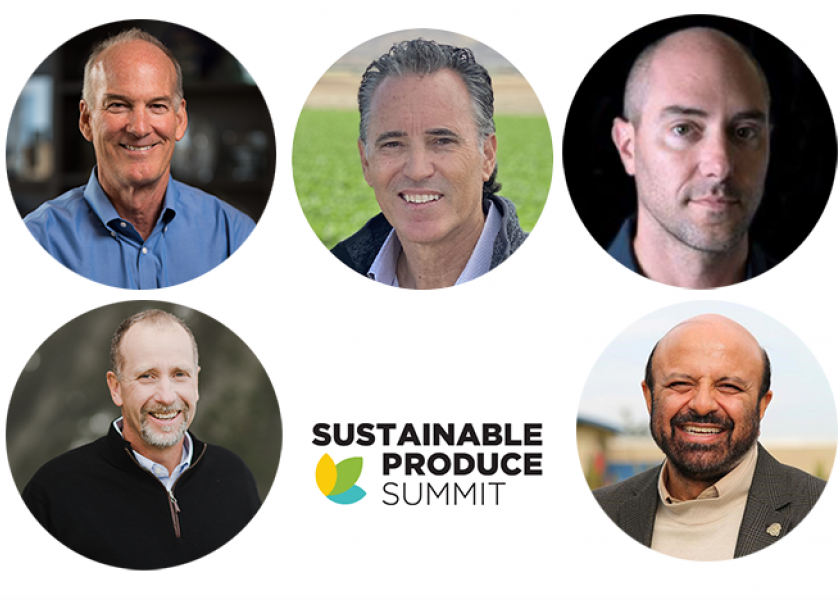Industry leaders detail sustainable changes, opportunities ahead

Prominent produce executives Bruce Taylor, Rod Braga and David Rosenberg discussed during a Sustainable Produce Summit panel the evolution of the industry and the opportunities that exist for companies to make their operations more sustainable.
Bruce Taylor, chairman and CEO of Salinas, Calif.-based Taylor Farms, described “a fantastic transformation” in the Salinas Valley toward sustainability — on two fronts.
“Conventional growers, through integrated pest management systems and all the other systems they’re using to reduce nitrogen applications ... are moving toward a more sustainable model,” Taylor said. “Organic growers are really exploding in the Salinas Valley. If you look at some of the major players, in addition to Braga Farms with Rod, you’ve got (Tanimura & Antle), you’ve got Nunes, you’ve got D’Arrigo, joining our Earthbound group as major shippers who are committing to the organic produce industry.”
While the market for organic produce is growing nicely, it is still limited because the product is more expensive due to higher input costs and lower yields, Taylor said.
For conventional growers, built environment can be a significant impediment to making operations more sustainable.
“People have huge investments in their operations, in their facilities, in their equipment package, and as you move toward more sustainability, as you move toward wind energy with wind turbines, solar energy with solar panels, it’s difficult to replace something you’ve already bought with something new,” Taylor said. “It’s easier if you’re growing.”
Braga, president and CEO of Soledad, Calif.-based Braga Fresh Family Farms, also described a widespread evolution in practices in the Salinas Valley.
“We’re following years and years here in the Salinas Valley of going from, when my father was out here, growing a lettuce field using an entire well pumping 2,000 gallons a minute probably for almost three days to furrow irrigate a lettuce field, and then we moved to sprinkler irrigation, then it was drip irrigation that was put in some time after the crop was in the field, now we’re moving — us and other farmers all through the valley — moving to burying that drip irrigation at the time that we plant it,” Braga said.
“Some areas we have to still use sprinkler irrigation to germinate it, but in some areas we’re actually able to germinate it with the drip irrigation,” Braga said. “This technology is allowing us to get the water where we want to have it at the right time, at the right depth ...”
Taylor noted that the move to precision agriculture and precision manufacturing means the produce industry will need people with different skill sets in the future. He recalled that during an early visit to Newark, N.J.-based AeroFarms he met four or five people with doctorate degrees from Cornell University.
“I thought, ‘We don’t have any of those and we’re growing 40,000 acres a year,’” Taylor said. “It was really eye-opening in terms of the knowledge base we needed to add to the Salinas Valley.”
Rosenberg, co-founder and CEO of AeroFarms, said he expects continued investment in the greenhouse produce industry, which he described as a developing sector.
“It’s not necessarily an industry where all of a sudden the solutions are there and we’re just on execution mode,” Rosenberg said. “We’re on both continuing to reinvent the playbook as well as execute and scale. And I will say the problems at a small farm are very different from the problems at a big farm, so even when we think we have a solution, scaling it up and seeing those not-foreseen challenges in scale is an opportunity as well as a risk, so being smart in de-risking certain elements of innovation as we go big.”
The group also discussed the importance of taking care of people for a sustainable business.
“We realized that paying ... a wage where they are attracted to come to you and come back and be a part of us, that that’s important,” Braga said. “If they are not able to live and work in the Salinas Valley and Imperial Valley and have access to housing and good health care, we know that we won’t be around for another 90 years, and that’s really the key to us.”
Rosenberg suggested that public-private partnerships and support for companies endeavoring to be more sustainable will be needed to push the industry forward.
“When the externalities are priced in, then good actors are rewarded for being good actors, innovators push innovation,” Rosenberg said. “That doesn’t happen organically; that happens with increasing standards of performance, and this is where the public sector really could play a bigger role to push innovators and create a level playing field for the good actors.
“You don’t want a good actor to be at a competitive disadvantage for being a good actor, whether they’re being good farmers or so forth,” Rosenberg said.
Taylor projected that millennials will be the ones to continue driving the industry toward greater sustainability.
“They’re very discerning consumers,” Taylor said. “They’re also amazing champions of sustainability.”







